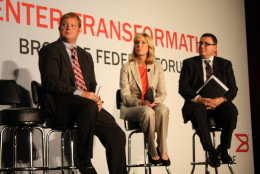Office of Management and Budget
-
Federal News Radio evaluated a total of five initiatives meant to rally federal managers' enthusiasm, expertise and duty as part of the special report, The Obama Impact: Evaluating the Last Four Years. We determined more progress was needed on the administration's performance management and regulation reduction efforts. We called the President's plan to reorganize the Commerce Department a bust but find effective efforts surrounding energy sustainability and cutting waste, fraud, abuse and improper payments.
September 17, 2012 -
President Obama has signed more than 130 executive orders since he took office. Federal News Radio compiled some of the orders most pertinent to federal employees and contractors.
September 17, 2012 -
The Obama administration's legacy over the past four years consists of major wins, missed opportunities and large scale busts. Federal News Radio evaluated 23 ideas and initiatives behind which the administration flexed its performance and management muscle over the last four years. We rated 10 of the 23 as "effective" and 13 of the 23 as "more progress needed" or "ineffective." In our special weeklong multimedia series, "The Obama Impact: Evaluating the Last Four Years" we review how well the administration was able to go from concept to strategy to implementation to success in the areas of management, technology, workforce and acquisition.
September 17, 2012 -
The across-the-board budget cuts, known as sequestration, set to take effect Jan. 2 would be "deeply destructive" to national security and core civilian agency programs, according to a comprehensive report from the White House detailing the impact of the cuts on specific programs and accounts. The $109 billion in cuts coming next year — split evenly between Defense civilian agency budgets — would slash Defense discretionary spending by 9.4 percent and civilian agency spending by 8.2 percent.
September 14, 2012 -
The President's Management Advisory Board wants agencies to focus on reducing improper payments and making strategic sourcing mandatory.
September 10, 2012 -
The White House plans to deliver a report to Congress late next week detailing how automatic, across-the-board cuts, set to take effect in January, will affect specific programs. The report is required under the Sequestration Transparency Act, which Congress overwhelmingly passed this summer and which the President signed on Aug. 7. The law directed the President to issue the detailed report within 30 days of signing it - a deadline that came this week and went unmet.
September 07, 2012 -
Acting Director Jeff Zients wrote in a blog post today that agencies have met half of President Obama's goal to save $8 billion by the end of 2013.
September 04, 2012 -
Over the last three years, agencies understood the problem better, improved how they tracked the information and used advanced data analysis tools to lower the governmentwide rate to 4.69 percent from 5.42 percent in 2009. While the amount of money improperly paid out hit a high of $125 billion in 2010, Danny Werfel, the Office of Management and Budget's controller, expects it to drop for a second consecutive year, below the $115 billion mark in 2011.
September 04, 2012 -
Civilian agencies may lose almost $40 billion dollars in top-line funding if sequestration goes into effect on Jan. 2, according to a new analysis by the Professional Services Council. Using fiscal 2012 as a baseline, PSC calculated civilian discretionary spending would decline by $39 billion and that individual agency budget would decline by 7.8 percent. More granular data are hard to come by until the Office of Management and Budget provides more details about specific about how the cuts will affect specific programs.
August 30, 2012 -
A new White House directive provides a roadmap for agencies to phase out the use of paper record-keeping by the end of the decade. By Dec. 31, 2019, federal agencies will be required, "to the fullest extent possible," to manage records electronically — including digital forms of communication, such as email — according to a directive from the Office of Management and Budget and the National Archives and Records Administration.
August 24, 2012 -
So, how does data center consolidation open doors for mission improvements? How does data center consolidation change the way you have to buy and manage mission critical systems? And how can agencies move money from operating and maintaining a data center to developing, modernizing and enhancing mission-critical systems?
August 24, 2012 -
Agencies considering allowing employees to use their own smartphones and other mobile devices on the job - known as bring-your-own-device (BYOD) - have a new toolkit at their disposal to ease the transition. The toolkit contains key considerations for agency IT managers, success stories from agencies that have already implemented such programs as well as sample existing policies at those agencies to serve as samples.
August 23, 2012 -
The department is trying to figure out the best way to manage the cards of contract employees after they leave the department. Every agency using a managed service provider for secure identity card issuance faces a similar challenge. Commerce also is working on integrating physical and logical access systems.
August 22, 2012 -
Spending levels appropriated by Congress, so far, for fiscal 2013 fail to live within the limits set by last year's Budget Control Act (BCA), the Office of Management and Budget said in a report issued Monday. If Congress fails to adhere to the annual limits, OMB is required to enact automatic cuts to bring them back into balance, Acting OMB Director Jeffrey Zients wrote in a letter to President Barack Obama that preceded OMB's report.
August 21, 2012 -
OMB issued fiscal 2014 technology project guidance detailing the steps agencies should take to reduce spending across six areas. Agencies also must tell OMB how it would reinvest the savings into new or innovative projects.
August 17, 2012



